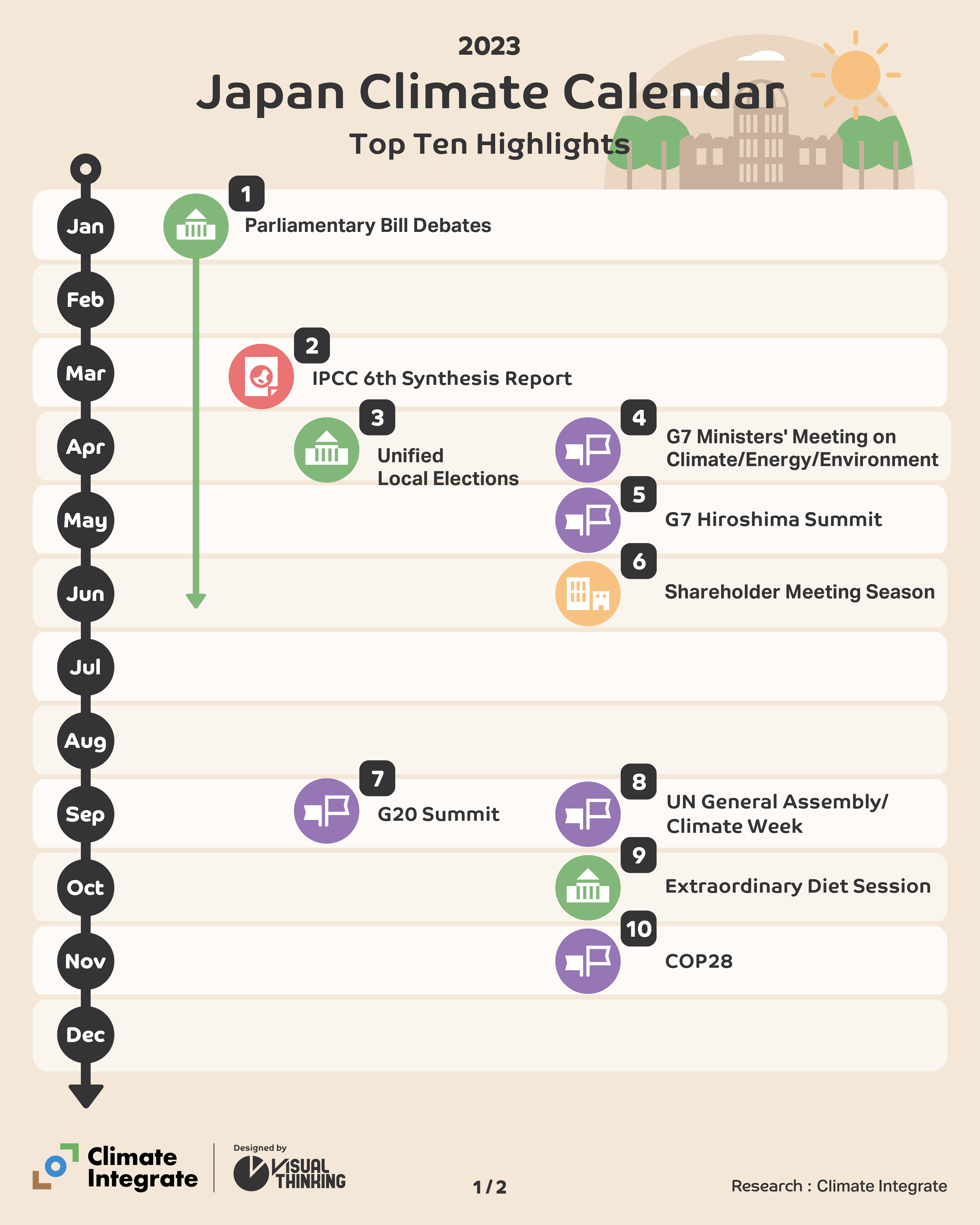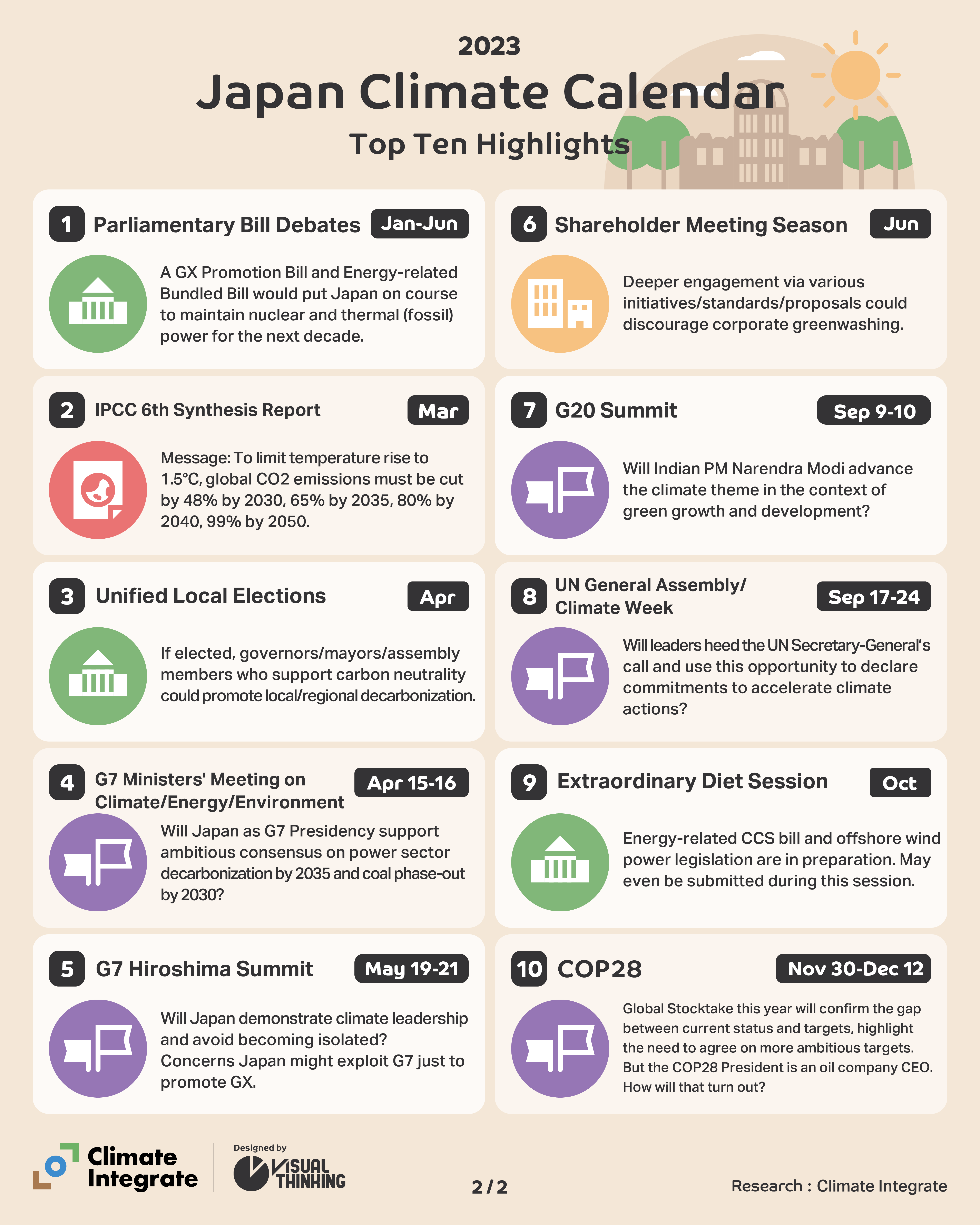
What will happen in 2023?
A look back at 2022
Over a year has passed since Russia invaded Ukraine in February 2022. The war has shaken the world, leading to increased military defense spending, energy and food crises, and more. Expanded fossil fuel development, exports and imports in countries other than Russia, and huge subsidies for fossil fuels in response to rising energy prices are having exactly the opposite effect of climate measures. On the other hand, some countries, mainly in Europe, are accelerating the transition to renewable energy, recognizing its advantages in terms of both cost and security.
The IPCC’s Sixth Assessment Report, released over 2021 and 2022, made it clear that it will become impossible to avoid more severe adverse effects of climate change unless there is a major course change, and that a 43% reduction of global greenhouse gas emissions is necessary by 2030 if we are to have a chance of limiting the global average temperature rise to 1.5°C. In fact, 2022 was a year when the world witnessed the intensification of climate change impacts, with major flooding in Pakistan, droughts in African countries, and accelerated melting of the Greenland ice sheet, etc.
However, the actions of each country are not keeping pace with what is needed. Global CO2 emissions began increasing again due to the post-COVID recovery, and global energy-related CO2 emissions reached a record high in 2022. The gap between reality and targets continues to widen.
At the COP27 Sharm El Sheikh Conference (27th meeting of the Conference of the Parties to the United Nations Framework Convention on Climate Change) in November, countries reaffirmed the goal of limiting the temperature rise to 1.5°C, but did not reach any agreement on calling for stronger actions. On the other hand, agreement was reached to establish a “loss and damage” fund for vulnerable countries affected by climate change.
In Japan, the momentum to strengthen climate policy has undeniably declined further in the face of the energy crisis. Meanwhile, a new initiative branded as the Green Transformation (GX) has emerged to bend fiscal spending toward certain “innovative” technologies.
Outlook for 2023
The window for limiting the temperature rise to 1.5°C is narrowing as every year passes. In 2023, countries need to adopt a greater sense of urgency to strengthen their targets and policies, and to accelerate the implementation of measures to close the emissions gap.
In particular, as the G7 Presidency in 2023, Japan should be adding impetus to global climate change efforts by bringing together the group of industrialized countries and connecting the discussions to the upcoming G20 and COP28 meetings.
Japan is rushing ahead with GX-related efforts, including steps to enact enabling legislation. But many are concerned that Japan’s so-called Green Transformation will increase the reliance on technologies that have no prospect of becoming feasible (such as ammonia and hydrogen co-firing, CCUS, and a revival of nuclear power), and that it will lock Japan into a flawed carbon pricing framework. It is important to ensure we are on a steady path to an energy transition based on a more central role for renewable energy. Unified local elections in April 2023 are expected to produce new leaders in local government and assemblies and energize local/regional zero-carbon efforts. The corporate sector will be increasingly pressured to develop transition plans that are consistent with 1.5°C by bolstering their short- and medium-term efforts to include Scope 3 emissions, as well as information disclosure and engagement, in the run-up to Japan’s season of annual shareholders’ meetings in June.
Highlight Summary

Commentary
Parliamentary Bill Debates (until June): GX Promotion Bill, etc.
A GX Promotion Bill and Energy-related Bundled Bill were submitted to the 2023 regular Diet session. Both of these bills will have a major impact on when (if ever) Japan achieves decarbonization.
The GX Promotion Bill (more formally, the Bill on the Promotion of a Smooth Transition to a Growth-Oriented Decarbonized Economic Structure) was proposed by the government in order to secure public and private investment for the realization of a Green Transformation. It has five pillars: (1) formulation of a GX Strategy, (2) issuance of GX Economic Transition Bonds, (3) introduction of carbon pricing, (4) establishment of a GX Promotion Agency, and (5) evaluation and review. The “GX Basic Policy” approved in February lists initiatives relating to energy efficiency, renewable energy, nuclear power, and other (hydrogen/ammonia/LNG procurement, storage batteries, recycled fuels, etc.), but neither the path to achieving carbon neutrality nor effectiveness in reducing CO2 emissions are indicated by this bill. It leans heavily on the idea of reducing CO2 emissions through innovation, with an emphasis on maintaining nuclear and thermal power generation. Massive subsidies to the existing energy industry could make it more difficult to phase out nuclear and coal-fired power. The bill proposes the issuance of Economic Transition Bonds aimed at raising funds for investing in technology development in areas such as nuclear and thermal power, and stipulates carbon pricing as a source of funding. However, that plan could actually hinder the introduction of carbon pricing that is needed for decarbonization, because the pricing scheme would start in fiscal 2028, and auctions to power generation companies in fiscal 2033, very late in the game. This bill could distort the direction of efforts over the next decade.
Like the GX Promotion Bill, the Energy-related Bundled Bill (Bill to Partially Amend the Electricity Business Act, etc. to Establish an Electricity Supply System for the Realization of a Decarbonized Society) is based on the GX Basic Policy, and bundles together amendments proposed for five existing laws (Basic Act on Atomic Energy, Electric Business Act, Act on the Regulation of Nuclear Source Material, Nuclear Fuel Material and Reactors (Reactor Regulation Act), Spent Nuclear Fuel Reprocessing Fund Act, Renewable Energy Special Measures Act). This method of bundling amendments (omnibus style) for deliberation is sometimes used by the Ministry of Economy, Trade and Industry (METI), but since bundled bills cover so many issues, careful deliberation of each one is nearly impossible. In most cases, the bills are passed as submitted, without any changes.
In addition, this bill proposes to dramatically change Japan’s nuclear power policies that have been in place since the triple meltdown at the Fukushima nuclear power plant. For example, the bill proposes to eliminate the upper limit on the operating life of nuclear power plants, which until now has been regulated at 40 years in principle and 60 years at most. It also proposes to transfer jurisdiction from the Nuclear Regulation Authority under the Reactor Regulation Act to the pro-nuclear METI, under the Electricity Business Act. Most of the public comments submitted on the basic policy were opposed to this shift in nuclear policy, but the Kishida administration adopted the bill in top-down fashion, with virtually no public debate. Japan’s energy policy will present serious problems going forward.
2 IPCC 6th Synthesis Report (March)
The Synthesis Report of the Sixth Assessment Report of the Intergovernmental Panel on Climate Change was released in March. It is an 85-page synthesis of crucial information from Working Groups I, II, and III reports, which were released sequentially between August 2021 and September 2022. There is also a 35-page Summary for Policymakers with helpful graphics. The bottom line is that to limit the temperature rise to 1.5°C, it is necessary to reduce global CO2 emissions relative to 2019 by 48% by 2030, 65% by 2035, 80% by 2040, and 99% by 2050.
3 Unified local elections (April)
Unified local elections are on April 9 to 23. In accordance with legislation, local elections (for governors, mayors, and assembly members) are held once every four years in Japan, on a unified schedule. The first date for unified local elections (April 9) is for electing prefectural governors, big-city mayors, and prefectural and big-city assembly members. The second date (April 23) is for electing mayors and assembly members of the remaining municipalities. Who actually gets elected as governors, mayors, and assembly members will be important in connection with decarbonization efforts at the regional and local level. These elections are an important opportunity for each and every person to exercise the power of the vote.
4. G7 Ministers’ Meeting on Climate, Energy and Environment (April 15 and 16)
Japan is the Presidency of this year’s G7 Summit. Ministerial meetings are being held throughout the year, with the main leaders’ summit in May. The one most closely related to climate change is the Ministers’ Meeting on Climate Change, Energy and Environment in Sapporo. Attention will be paid to whether leaders can avoid backsliding from the consensus of last year’s G7 summit in Germany and come to a more progressive agreement on phasing out fossil fuel dependency, gasoline vehicles (internal combustion engines), and coal power, and decarbonization of the electricity sector by 2035. However, the ministerial meeting’s outcomes are hard to predict, as Japan is the most regressive on these issues. Wide-ranging discussions are also expected on topics such as biodiversity, oceans, and financial system reform. The outcomes of this ministerial meeting will be a critical test for the success of the G7 Leaders’ Summit in May.
5 G7 Hiroshima Summit (May 19 to 21)
The G7 Summit will be held in Hiroshima, the constituency of Prime Minister Fumio Kishida. The PM’s purported aim here is to promote a world free of nuclear weapons, although Japan’s leadership has been questioned in the context of the world situation since Russia’s invasion of Ukraine. Meanwhile, climate change is an important theme for the other major countries. Responding to the urgency of the IPCC report, developed countries are expected to make strong commitments and promises to bolster their actions and pave the path toward the upcoming G20 and COP28 meetings. However, Japan is trying to emphasize its own concept of a Green Transformation, while also being notably reticent in discussions about accelerating efforts to exit from fossil fuels. If Japan persists in that reticence, it could end up being isolated at the G7 Hiroshima Summit, even while hosting the meeting. To demonstrate true leadership, Japan will need to lead the summit toward a consensus that includes clear commitments in the energy sector.
6 Shareholder Meeting Season (~June~)
Major Japanese companies generally hold their annual shareholders’ meetings around June every year. For shareholders and institutional investors, the period from March when corporate leadership develops policy until June when voting rights are exercised at shareholders’ meetings is an important time for engagement. To ensure that management and business plans are in line with the 1.5°C target of the Paris Agreement, companies, financial institutions, and investors need to formulate and disclose short- and medium-term transition plans to achieve the net zero target by 2050, covering not only Scope 1 and 2 but also Scope 3 emissions. Meanwhile, sector-specific benchmarks and standards consistent with 1.5°C have been set by various UN committees and public-private task forces to improve the credibility of net-zero declarations. These efforts include recommendations by a UN High-Level Expert Group to prevent greenwashing, such as the recommendation to refrain from using carbon offsets until 2030, and to phase out coal power by 2030.
7 Extraordinary Diet Session (~October~)
The extraordinary Diet session is usually quite brief, often not leaving sufficient time for bills to be deliberated, so it is highly likely that these bills will be submitted after the regular Diet session in 2024, but legislation related to climate change and energy currently under consideration includes a bill for the commercialization of CO2 capture and storage (CCS) technology (tentative name CCS Business Act) and a bill for the installation of offshore wind power generation facilities in the exclusive economic zone (EEZ). The CCS Business Act was proposed in the “CCS Long-term Roadmap Study Group Final Report” this March, as legislation to support the commercialization of CCS, with a target of between 120 and 240 million tons of CO2 storage by 2050 (about 9-18% of Japan’s total emissions). The details of the draft legislation are currently being discussed. However, CCS comes with many issues, including uncertainties about technical feasibility, high costs, challenges with securing stable reservoirs (especially in Japan), the net energy budget, and controlling the leakage of stored CO2. Many analyses have found that CCS is not an option for achieving carbon neutrality by 2050, so there are problems with Japan pushing forward with CCS.
On the other hand, Japan is one of the countries with the greatest potential for offshore wind, which countries such as the United Kingdom, Denmark, China, and the United States are rapidly introducing. The cost of offshore wind is expected to come down, so massive deployment of this technology is expected. With expanded use within its EEZ, offshore wind deployment is expected to see large gains in Japan as well.
8 G20 Summit (September 9 and 10)
The G20 Summit in 2023 will be held in New Delhi on September 9 and 10, with India as the Presidency. Prime Minister Modi is positioning its hosting of the G20 Summit as a major political event, and many events are being held in the country throughout the year. India is focusing on green growth and development but may find it difficult to make big moves forward in reducing fossil fuels such as gas and coal, with countries like China and Saudi Arabia also participating. But there is still hope that progress will be made in areas such as renewable energy, green hydrogen, and climate finance.
9 UN General Assembly/ Climate Week (September 17 to 24)
The United Nations General Assembly in 2023 will be held in the United States on September 19 in New York. The UN Sustainable Development Goals (SDGs) Summit is scheduled for September 19 and 20. The UN Secretary-General is planning to host the Climate Ambition Summit at around the same time, and is likely to call on heads of state to declare strong commitments to accelerate climate change measures. Also, Climate Week, held in New York every year at about this time, is scheduled for September 17-24. To build momentum for stronger action for decarbonization, Climate Week features events to introduce a variety of ambitious initiatives, and is led by many civil society actors, including the Climate Group, a group of companies with high climate ambitions. The series of meetings held a few months before the Conference of the Parties to the United Nations Framework Convention on Climate Change (COP) is regarded as an important political opportunity for the success of the COP.
10. COP28 Climate Conference (Dubai, November 30 to December 12)
COP28 (Conference of the 28 Parties to the United Nations Framework Convention on Climate Change) runs from November 30 to December 12 in Dubai, the capital of the Emirate of Dubai in the United Arab Emirates (UAE). COP28 will be held in a year when the so-called Global Stocktake is conducted to review the progress of efforts so far. In order not to close the path to limiting the temperature rise to 1.5°C, it is important for each country to commit with even greater urgency to significantly and rapidly reduce GHG emissions, to strengthen targets and mitigation plans leading to action, and to provide more ambitious financing. It is also important to build consensus for the swift implementation of the Loss and Damage Fund, which was agreed to last year.
The UAE, one of the world’s top oil-producers, has appointed Sultan Ahmed Al Jaber, UAE’s Minister of Industry and Advanced Technology and simultaneously CEO of the Abu Dhabi National Oil Company (ADNOC), as president of COP28.The international community has criticized the selection of the head of a fossil fuel company to preside over climate negotiations. Al Jaber says that the energy transition represents the greatest opportunity since the industrial revolution, claiming that he is not trying to avoid the energy transition. But this does not dispel concerns about the leadership of the conference. In order to avoid the climate crisis, it is crucial to build consensus through the collective efforts of the countries of the world.

